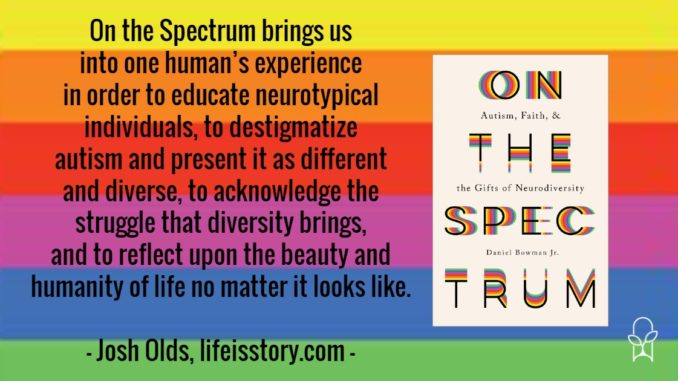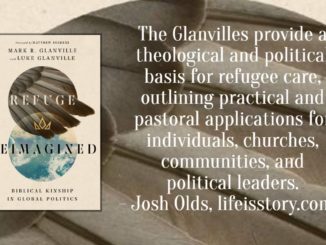
Published by Brazos Press on August 10, 2021
Genres: Non-Fiction, Memoir
Buy on Amazon
Goodreads

Nearly everyone knows someone on the autism spectrum, whether it's a niece or nephew, a student in their classroom, a coworker, or a sibling, spouse, or child. One in 54 children has autism, according to the CDC, and autism is reported across racial, ethnic, and socioeconomic groups. Yet most of what people think they know about autism is wrong.
On the Spectrum debunks myths with a realistic yet hope-filled deep dive into the heart, mind, and life of a Christian. Daniel Bowman, a novelist, poet, and professor, received an autism diagnosis at age thirty-five after experiencing crises in his personal and professional life. The diagnosis shed light on his experience in a new, life-giving way. In this captivating book, Bowman reveals new insights into autism, relationships, faith, and the gift of neurodiversity.
Rather than viewing autism as a deficiency, Bowman teaches readers--through stories of his heartbreaks and triumphs--authentic ways to love their neighbors as themselves, including their autistic neighbors who are fearfully and wonderfully, if differently, made.
Dan Bowman is an author, poet, professor, husband, son, father, Christian…and autistic. While there’s opportunity to misunderstand any one of these appellations, the one most commonly—and even purposely, though often ignorantly—misunderstood is autistic. On the Spectrum is a memoir, but it’s more than that. It’s a primer on autism that debunks myths and tears down stereotype, but it’s more than that. It’s a reflection on Christianity and the church and community, but it’s more than that. It’s about literature and writing and art and life, but again, it’s more than that. Because human beings are more than one thing, even if they are fully that thing. Each role overlaps the other, layering and layering until you finish with a fully-formed, nuanced, three-dimensional person. On the Spectrum isn’t about any one of these things. It’s about all of them and their intersectionality in the person of Daniel Bowman.
Bowman writes as an individual who was diagnosed with autism as an adult and who seeks to be understood, not just for himself but for the larger community of autistics. As indicated in the title, autism—like people in general—isn’t just one thing. That sets up Bowman’s foundational point. Autism isn’t one thing, because it isn’t rooted in a deficit. It isn’t the lack of something. It isn’t neurological disability, it’s a neurological difference. Autistics are a spectrum of individuals because people as a whole are a spectrum of individuals. Autism simply takes that same diversity of experience—of likes, dislikes, deficiencies, and expertise—and presents in a way that is sociologically different than the majority of people. Bowman writes that there is “an urgent need to move beyond a handful of iconic narratives” to bring about a robust understanding of autism in all its diversity. On the Spectrum is his attempt to do that, writing what he knows, or at very least is discovering: himself. And, if I may be so bold, it’s more of an iconic narrative than he’s willing to admit.
Of greatest importance, in my opinion, is Bowman’s emphasis on a model of neurodiversity that simply presents autistics as having a different neurological wiring. It is a disability created by society, because society is not usually set up to accommodate or understand this diversity. Instead, societally, we’ve treated autism with a model of pathology, treating it as deficit or as problem to be fixed rather than a difference to be understood. The call to move to a neurodiversity model is a transformational aspect of On the Spectrum. It has the power to foundationally reshape the way we approach autism and autistic individuals as a society and celebrate neurodiversity as a gift.
Moving from a pathology model to a neurodiverse paradigm helps reframe the personal elements in the book that follow. On the Spectrum is not a book about autism, or even a book about a person who “has autism.” It is a book about an autistic person. It is a book that shows how autism affects his everyday life, in both blessings and challenges. It is a personal book. It doesn’t claim to speak for other experiences of autistic people and recognizes that autism presents itself differently in different autistic people. Bowman simply offers his story as one other voice, one provides nuance and depth that goes beyond the way autism is stereotyped in media or has been viewed throughout history.
Daniel Bowman is an exceptional writer. His musings are reflective. His prose is evocative. He’s deeply honest and engaging, bringing the reader into places of privacy and vulnerability to help eradicate the stigma around neurodiversity and enable readers to understand and connect better with autistic people around them. He structures his essays into different themes. Community, place, family, work, writing, teaching—every piece of it an element of who Daniel Bowman is and every element of it relatable.
Along the way, he explores the effects being autistic has had on him. He humanizes autism. Which seems silly to say, because of course we perceive autistics to be human, but…really, just maybe, if your experience is limited to the media or the stereotype of a savant, you’ve only ever perceived autistics as being a certain type of person. On the Spectrum brings us into one human’s experience in order to educate neurotypical individuals, to destigmatize autism and present it as different and diverse, to acknowledge the struggle that diversity brings, and to reflect upon the beauty and humanity of life no matter it looks like. Life is story and Daniel Bowman’s story is one worth knowing. I’m so thankful for his vulnerability, his transparency, and his advocacy. Because of his work, the next generation of autistics—my son among them—will be better understood, by others but also themselves.



